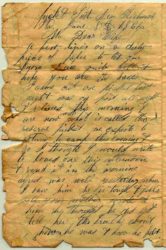
Cedar Christmas Tree
Holiday traditions cling like ivy.
As a youth, come mid-December,
I went hunting for a cedar tree with Dad.
We trekked across tan, sage grass fields,
December-drab pastures, or maybe drove
a mile or two into nearby woods
in his ’49 Chevy to find a suitable
dark green specimen about six feet tall,
not so misshapen it couldn’t be trimmed
to some semblance of conical symmetry.
We hauled it home, square-cut the trunk,
made a stand of two crossed boards
nailed to the bottom.
Whacked off a stray branch or two,
whittled the top to take a star.




 Nearly unreadable now, paper wrinkled
Nearly unreadable now, paper wrinkled

